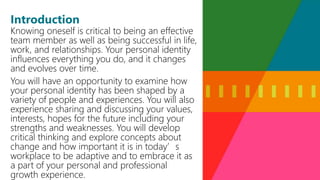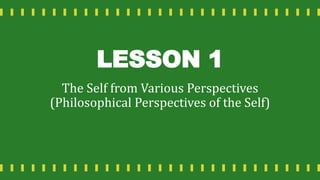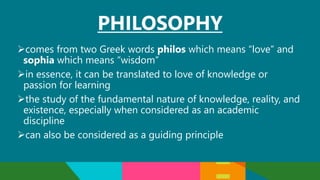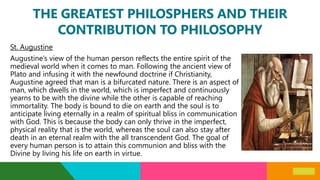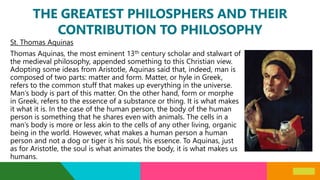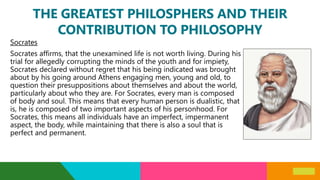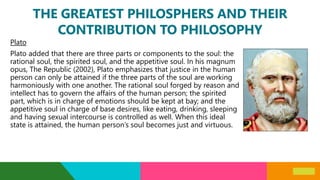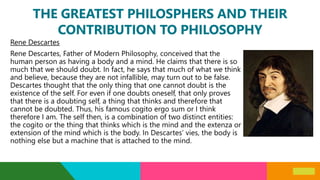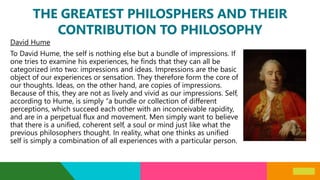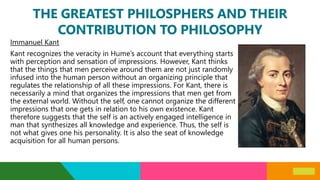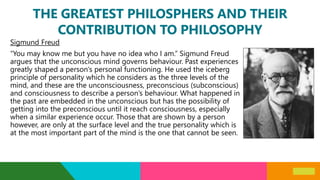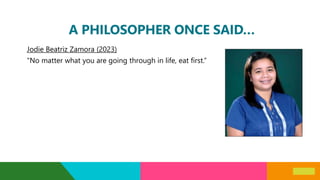HhwhshshshhhhdjjdjdshhdhsCUTS-Lesson-1.pptx
- 2. Introduction Knowing oneself is critical to being an effective team member as well as being successful in life, work, and relationships. Your personal identity influences everything you do, and it changes and evolves over time. You will have an opportunity to examine how your personal identity has been shaped by a variety of people and experiences. You will also experience sharing and discussing your values, interests, hopes for the future including your strengths and weaknesses. You will develop critical thinking and explore concepts about change and how important it is in todayŌĆÖs workplace to be adaptive and to embrace it as a part of your personal and professional growth experience.
- 3. LESSON 1 The Self from Various Perspectives (Philosophical Perspectives of the Self)
- 4. PHILOSOPHY ’āścomes from two Greek words philos which means ŌĆ£loveŌĆØ and sophia which means ŌĆ£wisdomŌĆØ ’āśin essence, it can be translated to love of knowledge or passion for learning ’āśthe study of the fundamental nature of knowledge, reality, and existence, especially when considered as an academic discipline ’āścan also be considered as a guiding principle
- 5. THE GREATEST PHILOSPHERS AND THEIR CONTRIBUTION TO PHILOSOPHY St. Augustine AugustineŌĆÖs view of the human person reflects the entire spirit of the medieval world when it comes to man. Following the ancient view of Plato and infusing it with the newfound doctrine if Christianity, Augustine agreed that man is a bifurcated nature. There is an aspect of man, which dwells in the world, which is imperfect and continuously yearns to be with the divine while the other is capable of reaching immortality. The body is bound to die on earth and the soul is to anticipate living eternally in a realm of spiritual bliss in communication with God. This is because the body can only thrive in the imperfect, physical reality that is the world, whereas the soul can also stay after death in an eternal realm with the all transcendent God. The goal of every human person is to attain this communion and bliss with the Divine by living his life on earth in virtue.
- 6. THE GREATEST PHILOSPHERS AND THEIR CONTRIBUTION TO PHILOSOPHY St. Thomas Aquinas Thomas Aquinas, the most eminent 13th century scholar and stalwart of the medieval philosophy, appended something to this Christian view. Adopting some ideas from Aristotle, Aquinas said that, indeed, man is composed of two parts: matter and form. Matter, or hyle in Greek, refers to the common stuff that makes up everything in the universe. ManŌĆÖs body is part of this matter. On the other hand, form or morphe in Greek, refers to the essence of a substance or thing. It is what makes it what it is. In the case of the human person, the body of the human person is something that he shares even with animals. The cells in a manŌĆÖs body is more or less akin to the cells of any other living, organic being in the world. However, what makes a human person a human person and not a dog or tiger is his soul, his essence. To Aquinas, just as for Aristotle, the soul is what animates the body, it is what makes us humans.
- 7. THE GREATEST PHILOSPHERS AND THEIR CONTRIBUTION TO PHILOSOPHY Socrates Socrates affirms, that the unexamined life is not worth living. During his trial for allegedly corrupting the minds of the youth and for impiety, Socrates declared without regret that his being indicated was brought about by his going around Athens engaging men, young and old, to question their presuppositions about themselves and about the world, particularly about who they are. For Socrates, every man is composed of body and soul. This means that every human person is dualistic, that is, he is composed of two important aspects of his personhood. For Socrates, this means all individuals have an imperfect, impermanent aspect, the body, while maintaining that there is also a soul that is perfect and permanent.
- 8. THE GREATEST PHILOSPHERS AND THEIR CONTRIBUTION TO PHILOSOPHY Plato Plato added that there are three parts or components to the soul: the rational soul, the spirited soul, and the appetitive soul. In his magnum opus, The Republic (2002), Plato emphasizes that justice in the human person can only be attained if the three parts of the soul are working harmoniously with one another. The rational soul forged by reason and intellect has to govern the affairs of the human person; the spirited part, which is in charge of emotions should be kept at bay; and the appetitive soul in charge of base desires, like eating, drinking, sleeping and having sexual intercourse is controlled as well. When this ideal state is attained, the human personŌĆÖs soul becomes just and virtuous.
- 9. THE GREATEST PHILOSPHERS AND THEIR CONTRIBUTION TO PHILOSOPHY Rene Descartes Rene Descartes, Father of Modern Philosophy, conceived that the human person as having a body and a mind. He claims that there is so much that we should doubt. In fact, he says that much of what we think and believe, because they are not infallible, may turn out to be false. Descartes thought that the only thing that one cannot doubt is the existence of the self. For even if one doubts oneself, that only proves that there is a doubting self, a thing that thinks and therefore that cannot be doubted. Thus, his famous cogito ergo sum or I think therefore I am. The self then, is a combination of two distinct entities: the cogito or the thing that thinks which is the mind and the extenza or extension of the mind which is the body. In DescartesŌĆÖ vies, the body is nothing else but a machine that is attached to the mind.
- 10. THE GREATEST PHILOSPHERS AND THEIR CONTRIBUTION TO PHILOSOPHY David Hume To David Hume, the self is nothing else but a bundle of impressions. If one tries to examine his experiences, he finds that they can all be categorized into two: impressions and ideas. Impressions are the basic object of our experiences or sensation. They therefore form the core of our thoughts. Ideas, on the other hand, are copies of impressions. Because of this, they are not as lively and vivid as our impressions. Self, according to Hume, is simply ŌĆ£a bundle or collection of different perceptions, which succeed each other with an inconceivable rapidity, and are in a perpetual flux and movement. Men simply want to believe that there is a unified, coherent self, a soul or mind just like what the previous philosophers thought. In reality, what one thinks as unified self is simply a combination of all experiences with a particular person.
- 11. THE GREATEST PHILOSPHERS AND THEIR CONTRIBUTION TO PHILOSOPHY Immanuel Kant Kant recognizes the veracity in HumeŌĆÖs account that everything starts with perception and sensation of impressions. However, Kant thinks that the things that men perceive around them are not just randomly infused into the human person without an organizing principle that regulates the relationship of all these impressions. For Kant, there is necessarily a mind that organizes the impressions that men get from the external world. Without the self, one cannot organize the different impressions that one gets in relation to his own existence. Kant therefore suggests that the self is an actively engaged intelligence in man that synthesizes all knowledge and experience. Thus, the self is not what gives one his personality. It is also the seat of knowledge acquisition for all human persons.
- 12. THE GREATEST PHILOSPHERS AND THEIR CONTRIBUTION TO PHILOSOPHY Sigmund Freud ŌĆ£You may know me but you have no idea who I am.ŌĆØ Sigmund Freud argues that the unconscious mind governs behaviour. Past experiences greatly shaped a personŌĆÖs personal functioning. He used the iceberg principle of personality which he considers as the three levels of the mind, and these are the unconsciousness, preconscious (subconscious) and consciousness to describe a personŌĆÖs behaviour. What happened in the past are embedded in the unconscious but has the possibility of getting into the preconscious until it reach consciousness, especially when a similar experience occur. Those that are shown by a person however, are only at the surface level and the true personality which is at the most important part of the mind is the one that cannot be seen.
- 13. THE GREATEST PHILOSPHERS AND THEIR CONTRIBUTION TO PHILOSOPHY Sigmund Freud He also formulated his Psychosexual Stages of Development wherein he identified specific changes in the sexual parts of the body (mouth, anus, phallic, genital ) he called erogenous zones that corresponds to an individualŌĆÖs age/developmental stage (from infancy to early adulthood). The manifestations of untoward or fixated adult behaviour according to Freud are the products of unsatisfied desire in any of those stages. So for him, the changes experienced by a person, be it sexual or social should be understood in its full context: unless you understand your past experiences, you cannot understand your present self.
- 14. A PHILOSOPHER ONCE SAIDŌĆ” Jodie Beatriz Zamora (2023) ŌĆ£No matter what you are going through in life, eat first.ŌĆØ
- 15. What do you think is the implication or the essence of these philosophies in your life?
- 16. -End-

